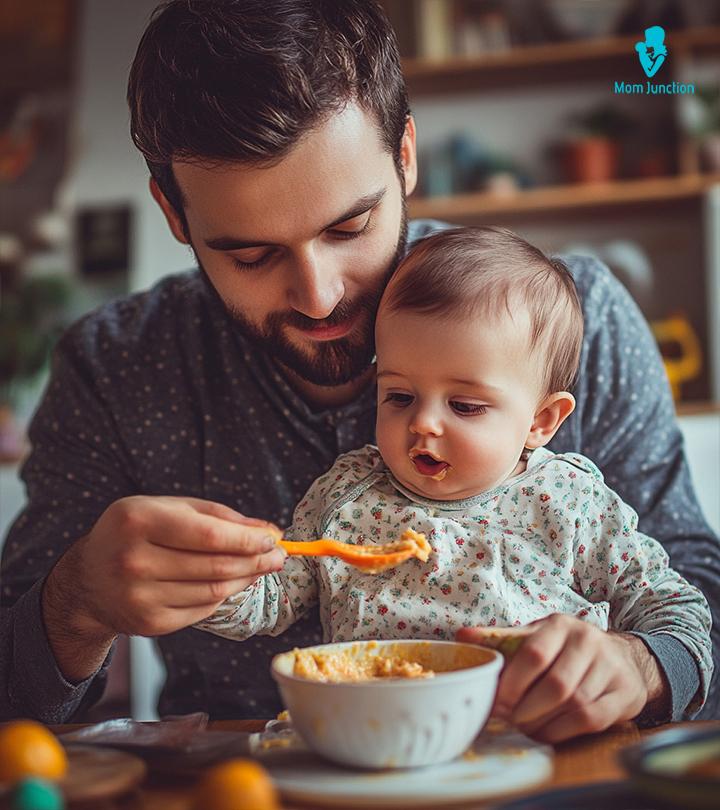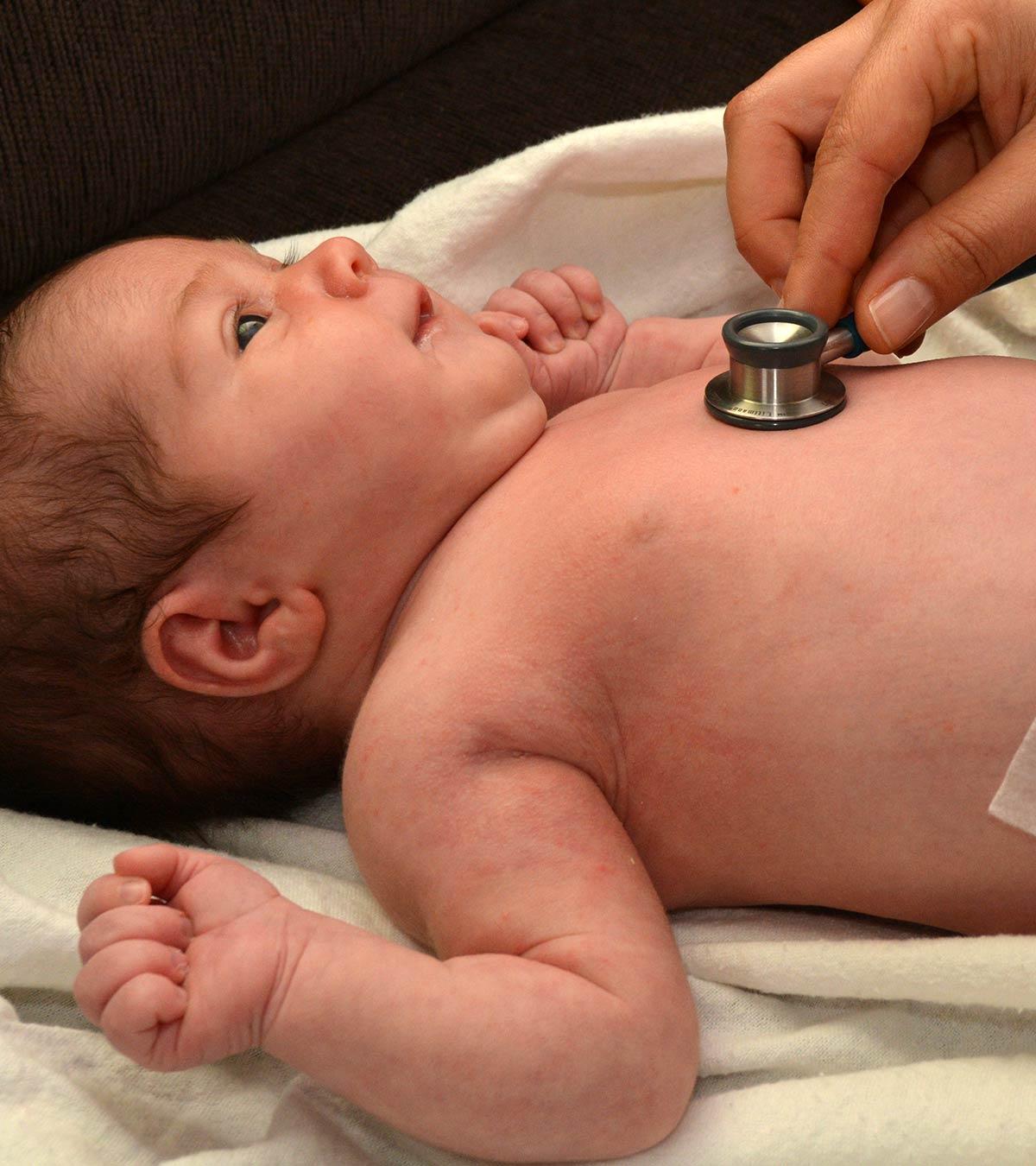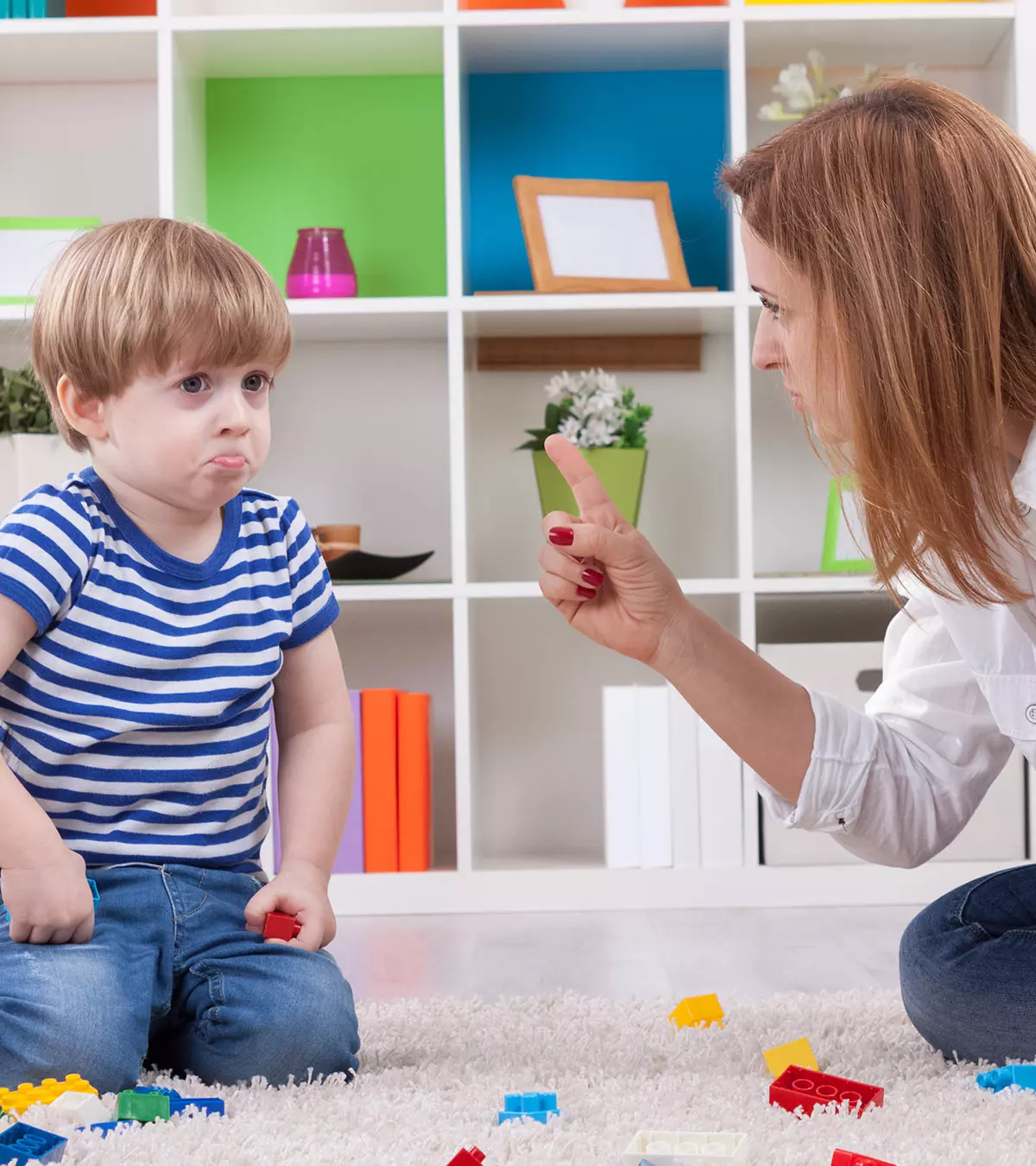
Image: Shutterstock
At times, it is not the child’s fault but bad parenting that can have lasting effects on the child’s psyche and behavior. Of course, as parents, you only want the best for your children. But this same instinct may lead to parenting behaviors that can be detrimental to your child’s development. Although it may not be intentional, once you’ve spoken or done something to leave them hurt and scarred, it cannot be undone.
For most, “bad parenting” is a myth because they assume that no parent would do anything bad for their children. But it’s the harsh words or harsh rules and punishments that can leave a negative impact, potentially harming a child’s physical and mental health in the long run (1). So, in this post, we tell you all about it, including the signs of a bad parent and ways to become a good one.
Key Pointers
- Bad parenting can have a lasting impact on a child’s behavior and psychology, with some parents feeling guilty and others being indifferent.
- Examples of bad parenting include reprimanding, scolding, punishing, hitting the child, giving advice instead of encouragement, and lacking affection.
- Neglecting a child by not offering support, constantly comparing them, and not acknowledging their achievements can make them feel undervalued.
- Overly helping and pampering a child can also be bad parenting and lead to arrogance.
- Long-term consequences of bad parenting can include a lack of empathy, difficulty forming relationships, anxiety, depression, and even criminal behavior.
What Is Bad Parenting?
The definition of bad parenting is not a single act of poor nurturing but rather a series of such actions that invariably harm the little one’s demeanor and psychology. The influence of parents on children is significant. A parent may feel guilty and will try to reconcile, but it often yields poor results.
Unsurprisingly, many parents do not realize their folly since the deed was unintentional or perhaps they are too busy to learn to be an active parent. Some parents are not prepared for a worst-case scenario, while a segment does not care enough. These attributes and actions all sum up to refer to bad parenting skills.
What Are The Signs Of Bad Parenting?
Several parenting incidents point towards being a bad parent. Here are some unintentional things you could be doing to fit the label of being a bad mother or father:
1. The child is reprimanded even if he spoke the truth

The child did something wrong and acknowledged it; nevertheless, you scold him for committing a mistake. And you have forgotten that he was courageous enough to be truthful. For instance, the child accidentally breaks a vase while playing indoors and admits his mistake, hoping for understanding. Instead of acknowledging his honesty, you react with a harsh scolding for his carelessness, leaving the child discouraged from being truthful in the future.
2. You scold, punish and hit the child in front of everyone
There is no hesitation in castigating the little one, irrespective of the place and the people. You scold him in front of his siblings, grandparents, cousins, and even neighbors. You even whip a slap or two. For example, during a family gathering, your child accidentally spills juice on the table. You immediately scold him loudly, calling him careless and irresponsible. This leaves the child feeling humiliated and embarrassed in front of their family and friends.
 Do remember
Do remember3. More advice, less encouragement
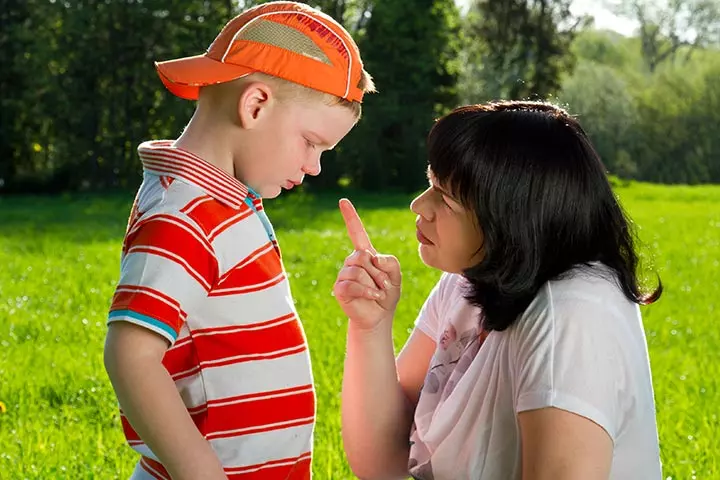
All you do is tell him how to do things (“You should wake up early for better grades.”) rather than encourage him with positive words (“You are far intelligent dear. I’ll help you wake up early to get better grades.”) This can be a sign of strict parenting.
4. Not displaying adequate affection
Ever wondered why your child is always trying to get your attention by troubling you with naughty tricks? It is quite likely that he feels a lack of emotional connection and warmth from his parents. For example, your child constantly disrupts your work by making loud noises or throwing toys around. What appears to be mischief might actually be the child’s way of seeking attention.
5. Not supportive when he needs you the most

It could be your child’s school examination time when he needs a lot of support from you. But you focus on your official work or another commitment, which makes the child feel neglected. and shows inconsistent parenting.
6. There is always a comparison to someone else
It is good to set positive role models for your child but always comparing him with someone, especially a sibling or the child next door, is a sign of bad parenting. For instance, you frequently compare your child to a sibling, saying things like, “Why can’t you be more like your brother? He always gets top marks.” Such comparisons lead the child to feel inadequate.
7. Never proud of the achievements

You express no excitement or joy when your kid comes home beaming with pride about his win in a contest. In fact, there have been few instances of pride in your parenthood.
8. Always having a criticizing tone
You see everything the child does in a negative light, and are always critical of him. This is different from not appreciating something since there you are indifferent, but here you just disapprove of everything. For instance, the child attempts to set the table, but then you quickly respond, “You didn’t do it right. You forgot the napkins.” Whether it’s chores, homework, or any other task, you constantly highlight mistakes without offering any positive reinforcement.
9. Make no efforts in understanding and respecting the feelings

You may spend a lot of time teaching good things but never spare a moment to understand the little one’s opinion and feelings. Every time he shares something, you rule it out as gibberish and do not take it seriously. For example, the child eagerly talks about a new game he played, saying, “It was so fun! I beat all the levels!” You dismiss the excitement, responding, “That’s not important. You’re just wasting your time.”
10. Not showing the right way of doing things
It is not just about showing the path but also walking with the child for the first few steps. Investing more in actions than words is important. For example, you ask the child to complete a homework assignment but don’t explain how to start or manage it. Instead of working through the task together, you say, “Just figure it out on your own.” The child feels lost and unsure of how to proceed, creating unnecessary pressure and frustration.
11. Setting poor examples

Children learn habits, whether good or bad, from their parents. If the child does something wrong and inappropriate, then spare a moment to introspect for he may have learnt it from you. For instance, a child may use rude language when angry, and you may happen to use the same language when you are upset. The child has probably learned this behavior from you, showing how children tend to mirror the actions they observe at home.
12. The child is never offered a choice
Parents decide everything for their children, from the school they study to the clothes they wear. In this process, you tend to get rigid to the point that you forget to give a choice to the child. That makes the child yearn for other things, and in some cases, he will not hesitate even to take it without authorization.
13. Pampering to the point the child becomes arrogant

It’s nice to shower attention and materialistic love but not so much that the child becomes a spoilt brat. He takes everything for granted and does not understand the value of anything. It makes him pretentious, which can lead to the formation of a negative social image.
14. Help solve even the smallest problems
It is good to hold the hand but not to the point that the child is unable to do anything on his own. This results in low self-confidence and self-esteem.
Keith Yancy, a father, shares a challenging experience his daughter faced when a friend treated her poorly by mocking her and deliberately excluding her. His wife advised him to stay patient and resist the urge to intervene. Reflecting on the situation, he says, “She’s (wife) right, of course. The thought of me confronting this other girls’ parents, or complaining to the school, or teaching my kid martial arts is an absurd overreaction to a run-of-the-mill, kid-type problem. Yet despite having 15 years of parenting experience, it’s really, really hard to not take some type of action.
“And yet, because there’s no serious abuse or excessive bullying going on, it’s the right thing to do. Kids need to learn how to deal with adversity on their own. They need to develop the coping skills to deal with this minor stuff without their parents hovering over them, without having the benefit of constant parental “social engineering” to make everything go their way. I suspect that many kids today have never had to genuinely handle these types of social situations because of such “helicopter parents” solving all their problems (i).”
Along with these signs of bad parenting, there are also certain habits that make you a bad parent.
15. Physically intimidate the child

You just raise your hand, or worse, show a fist every time your child does something wrong. Intimidation or physical abuse has become your primary tool to discipline your child, irrespective of the mental or physical impact it has on him. Controlling parents who cultivate fear towards their child to maintain control are engaging in behavior tantamount to bullying, which is quite a pathetic thing.
16. Giving short, grumpy answers

A child needs guidance through wise and comforting words, but instead, you choose to respond in terse replies that leave the child bewildered yet also disappointed. They may approach you multiple times to get an appropriate reaction, but you continue to be stubborn. Uninvolved parenting can lead to such interactions, where the lack of engagement and support can cause significant harm.
Bad parenting via verbal abuse can have a lasting impact on the child, and often the damage is irreversible.
How Does Bad Parenting Affect A Child?
The consequences of bad parenting are serious and may have long-term repercussions. Here are the adverse effects of bad parenting on a child:
- Lack of empathy towards others: Children behave with others the way their parents treat them. If a child is treated with indifference at home, then it is quite likely he will display similar emotion at school and elsewhere. Such children eventually develop apathy towards other human beings.
- Have trouble establishing lasting friendship and relationship: It can happen due to low self-confidence or brash behavior, both that would have arisen from authoritarian parenting style and other parent-child relational issues. Studies have shown that when parents do not invest emotionally in their children, the child can subsequently develop problems regulating emotions and is unable to interact with others (2).
 Caution
CautionAccording to a question-based demographic survey, children raised with authoritative parenting were more likely to exhibit positive behavior during their initial dental visit than children raised with authoritarian or permissive parenting styles. These findings corroborate that a child’s emotional regulation abilities are affected by parenting style.

Effect of different parenting styles on child’s behavior
Source: Correlating Parenting Styles with Child Behavior and Caries- Development of anxiety and depression: Research has shown that children who experience bad parenting during their childhood are at a greater risk of developing anxiety and depression as adults (3). Your bad parenting today can affect the child’s mindset, making him an ineffective parent later in life.
- Psychological disordersiConditions that have an impact on a person's emotions, actions, or thoughts and affect their daily life. : When you are at the extreme of being a bad parent, the child can develop severe mental disorders that may take years to overcome or never rectify at all. Such children tend to become social misfits as they step into adulthood. It dims their opportunity to be an integral part of the society, eventually making them an outcast.
- Point to remember: There is a misconception that bad parenting leads to autismiA developmental disability that affects the behavior and communication of an individual. in children. Autistic children need a different kind of parenting style but are certainly not the result of poor or bad parenting (3).
- Criminal behavior: Some parents indulge in corporal punishmentiA physical penalty used against children that includes hitting. since they believe it is the only way of dealing with naughty children. However, repeated use of physical reprehension can make the child think it is okay to strike someone for any reason. As the child steps into adulthood, this belief transforms into an immoral inclination to cause deliberate harm to others.
These conditions seem quite frightening, but it is never too late or difficult to change your parenting style for the greater good of your child.
How To Be A Better Parent?
It is never too late to change your parenting style, and here are some tips on being a better parent:
1. Have hands-on involvement in parenting
You are not just the guardian of the child but also someone who teaches essential life lessons. Go beyond the provisionary creature comforts, and strike an emotional rapport. Focus on a relationship that has control, but not at the cost of love, so that the child has a healthy upbringing.
2. Refrain from yelling and striking the child
Children can be difficult with their tendency to be naughty. It is quite likely you lose patience and yell, which can leave the child wailing and upset. Some parents have few qualms about slapping their child, even if it is in front of relatives or even strangers. That makes you bad parents. You may feel sorry for it later, but the damage would have been done.
Learn to control the child’s naughty outbursts in a more reasonable manner. For example, if he breaks a sibling’s toy, then take away his favorite toy and say he gets it only when he apologizes and promises never to do it again. Once he does so, you must explain to him why his actions were wrong, and how he must never damage someone else’s belongings.
3. Give reasons for your instructions
A child will not understand the underlying purpose behind an instruction like “Sleep on time at night.” As a parent, it is your duty to elaborate on the reasons in a manner the kid understands. Do not say things like “Because I say so!” or “Do not ask questions, just go to bed!” That sets a wrong precedent, and children have a natural tendency to oppose things they do not understand.
4. Set rules after discussion
If you set some new rules, then have a word with the child before implementing them. That way, he is a part of the proceedings and is aware that he is not supposed to do some things. Having discussions with the child makes them feel important, and can boost their self-esteem. He will also be in charge for his actions and will hesitate to do something wrong.
5. Let the child have some choice
Ask for an opinion before deciding something for the child. It is more applicable for adolescents, who may feel irked when no one asks about their preference before making a decision for them. For example, instead of jumping to a conclusion, “You need a new tuition. I will get it changed tomorrow”, you can say, “I don’t think this tuition is working out well. Shall we get it changed tomorrow?” It is an excellent way to teach the child decision-making, and invariably introduce him to the concept of being responsible.
6. Listen when he says something
Good parenting is also about listening to your child with rapt attention when he has something to share. It includes his mundane narrative of the day and all his achievements, which all seem trivial but could mean a lot to the child. Do not brush aside his words to hear them another day or override it with something else like “I will listen to you later, first get your room cleaned!” That is disheartening, and although it is just a child, he does sense that you just behaved with him rudely.
Appreciate your little one when he is truthful and honest. Children who are reprimanded for speaking the truth may eventually prefer a lie to save their skin.
7. Set good examples
An action can talk louder than words, and it is perhaps the best way to make your child understand the importance of something. You set a positive example by practicing something that you always ask your child to do. Children learn healthy habits from parents and are less likely to adopt bad ones when their parents themselves refrain from it.
Frequently Asked Questions
1. What are the causes of bad parenting?
Bad parenting could result from parental substance abuse or drug abuse, egoism, lack of education, poverty, having an unplanned child, or inability to fulfill career goals. In some cases, marital problems, pressure at work, and financial problems could also be the reasons.
2. What are the biggest parenting mistakes?
Parents could commit certain mistakes knowingly or unknowingly. Some common parenting mistakes include being too strict with children, not allowing them to speak or explore freely, taking them for granted, parental neglect, emotional abuse and being overly possessive. If you could relate to any of these, try to avoid them and work on yourself, so your children are not affected.
3. How can society help prevent bad parenting?
Society can play a vital role in preventing bad parenting through various approaches. These include providing parenting education and support programs, ensuring accessible resources and mental health support for parents, implementing social safety nets, promoting community involvement, and raising public awareness about positive parenting and child well-being. By investing in these areas, society can create an environment that supports parents, equips them with the necessary tools, and fosters a sense of community that prioritizes the well-being of children.
4. How can a child overcome the effects of bad parenting?
The child may seek the support of a trusted adult and build a support network of friends and loved ones to heal from the emotional wounds. Furthermore, they may engage in self-improvement and care through therapies and counseling and focus on their education for growth and recovery. Finally, the community or the surrounding well-wishers should create a nurturing environment to aid in the process of healing.
5. Can bad parenting be a result of a lack of parental education or support?
Yes, parents without adequate parental education may not understand child development requirements and ways to discipline the child while dealing with their own stress effectively. In addition, a lack of support systems such as their spouse, family, friends, or the community may expose them to an overwhelming sense of responsibility and isolation, adding to their lack of confidence as a parent.
Bad parenting is a consequence of a parent’s actions that could harm a child’s psychological and behavioral aspects. For example, it could be unintended acts, including too much pampering, hitting a child publicly, not motivating, supporting, or loving them enough. Bad parenting could hamper a child’s physical and emotional well-being and have long-term consequences. Therefore, it is best to incorporate better parenting approaches and refrain from hurting your child. Moreover, right parenting is crucial for the child’s holistic development and future. Also, one must remember that while bad parenting can be rectified, one must not be overly worried about bad situations affecting the lives of their children.
Mim Butler, a parent and a school principal, says parents must not be worried that every bad situation can have negative implications for the children’s future. She says, “I agree that things that happen to us as children shape and mold us, but not every negative situation molds us for the worse (ii).”
Infographic: What Causes Bad Parenting?
Bad parenting adversely affects children, but do you know why a parent or parents behave badly with their children? This infographic shares different factors that can make parents unintentionally neglect their child’s physical, social, and emotional needs. Illustration: Momjunction Design Team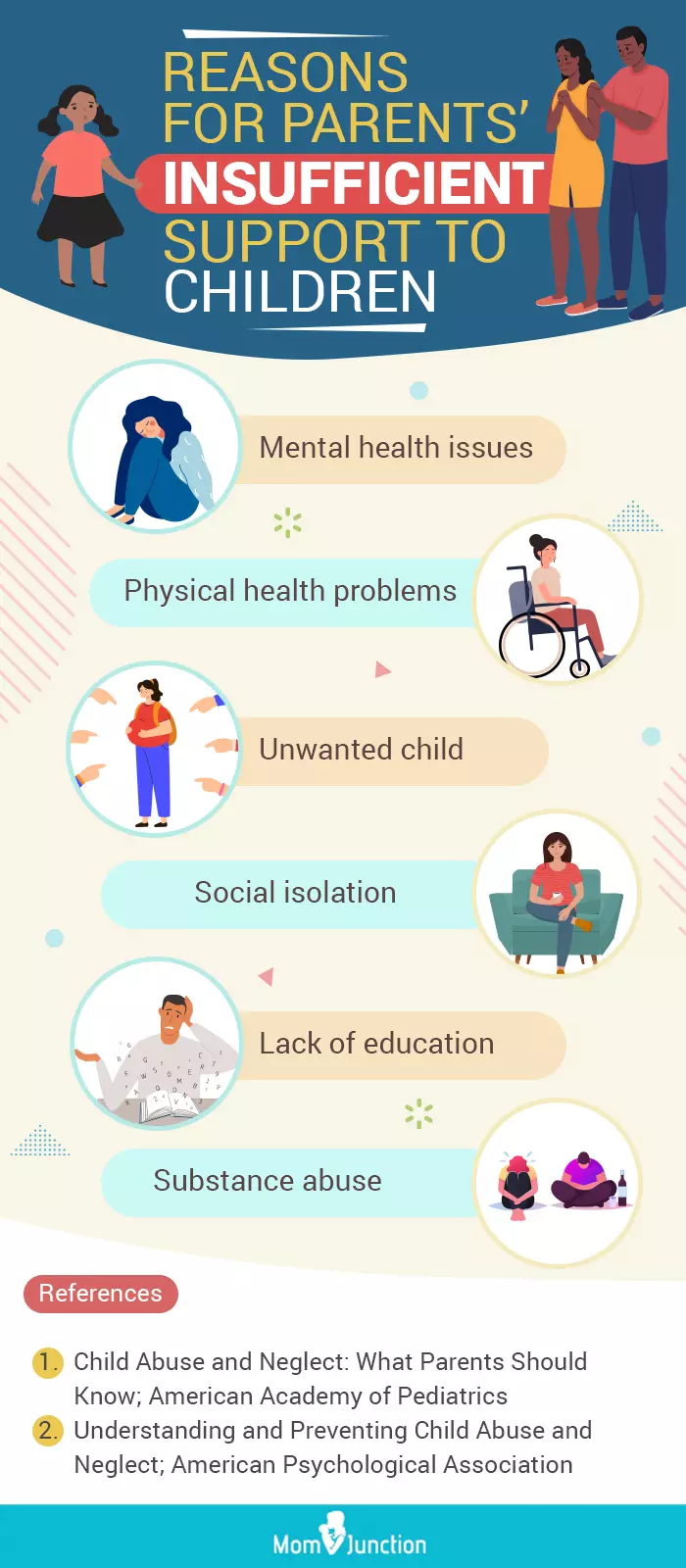
Illustration: Signs of Bad Parenting And 7 Tips To Change

Image: Dall·E/MomJunction Design Team
Personal Experience: Sources
MomJunction articles include first-hand experiences to provide you with better insights through real-life narratives. Here are the sources of personal accounts referenced in this article.
i. I refuse to be a helicopter parent;https://counterpoint22.wordpress.com/2010/12/18/i-refuse-to-be-a-helicopter-parent/
ii. Don’t be scared of hard;
https://launchingkidsforlife.wordpress.com/
References
- What’s the Best Way to Discipline My Child?
https://www.healthychildren.org/English/family-life/family-dynamics/communication-discipline/Pages/Disciplining-Your-Child.aspx - Parents’ Views of Early Social and Emotional Development.
https://sedlpubs.faculty.ucdavis.edu/wp-content/uploads/sites/192/2015/03/NewtonThompson.pdf - The Relationship Between the Poor Parenting in Childhood and Current Adult Symptoms of Anxiety and Depression: Attachment as a Mediator.
https://scholarsarchive.byu.edu/cgi/viewcontent.cgi?referer=&httpsredir=1&article=6860&context=etd - Should scientists study mothers of children with autism?
https://www.thetransmitter.org/spectrum/should-scientists-study-mothers-of-children-with-autism/?fspec=1
Community Experiences
Join the conversation and become a part of our nurturing community! Share your stories, experiences, and insights to connect with fellow parents.
Read full bio of Dr. Carlos Juan Carmona-Goyena
Read full bio of sanjana lagudu
Read full bio of Rohit Garoo
Read full bio of Apoorva K











